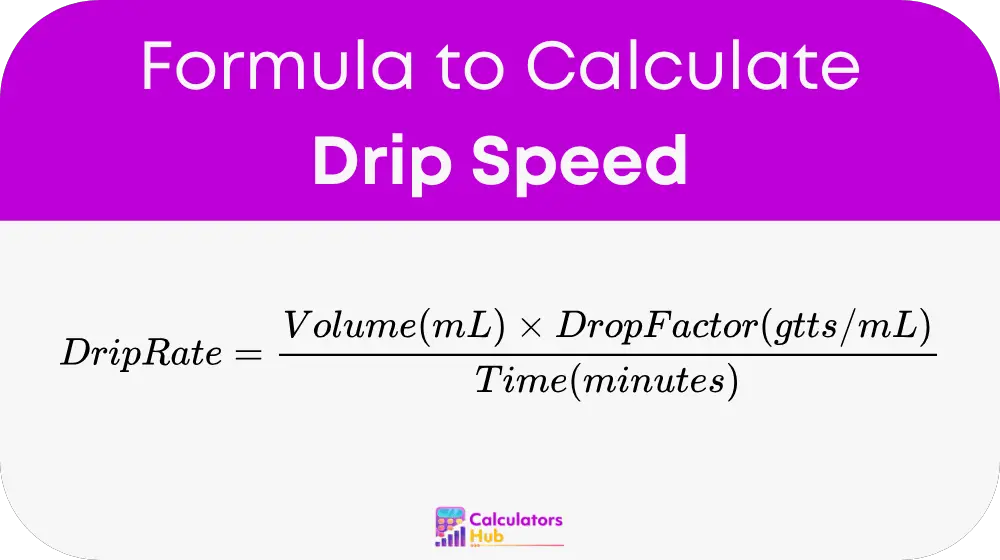The Drip Speed Calculator is a vital medical calculation tool used primarily in nursing and other healthcare fields. Its purpose is to calculate the specific rate at which IV fluid drops must fall per minute to deliver a prescribed volume of fluid or medication over a set duration. This calculation is necessary when using gravity infusion systems, where the flow rate is manually controlled by adjusting a clamp on the IV tubing and counting the drops in the drip chamber.
This calculator helps healthcare providers:
- Determine the correct drip rate in drops per minute (gtts/min).
- Ensure patients receive the precise volume of IV fluid or medication as ordered by a physician.
- Administer infusions safely over the specified time frame.
- Prevent potential complications associated with incorrect infusion rates (too fast or too slow).
- Standardize the process of setting up gravity IV infusions.
Accurate calculation using this tool is a fundamental aspect of safe medication administration and fluid management in clinical practice.
Formula of Drip Speed Calculator
The drip speed, or drip rate, is calculated using a standard formula that relates the total volume to be infuse, the duration of the infusion, and the specific type of IV administration set being use.
The formula is:

Where:
- Drip Rate (drops/min): This is the number of drops that should fall in the drip chamber each minute to achieve the desired infusion rate. It is often abbreviated as gtts/min.
- Volume (mL): This is the total amount of fluid (in milliliters) that needs to be infused into the patient.
- Drop Factor (gtts/mL): This is a characteristic of the specific IV administration (tubing) set being used. It indicates how many drops make up one milliliter of fluid for that particular set. The drop factor is always printed on the packaging of the IV tubing.
- Common Macrodrip sets (used for routine or rapid infusions) typically have drop factors of 10, 15, or 20 drops/mL.
- Microdrip sets (used for precise or low-volume infusions, often in pediatrics or for certain medications) always have a drop factor of 60 drops/mL.
- Time (minutes): This is the total duration over which the specified volume needs to be infuse, converted into minutes. (For example, an 8-hour infusion is 8 × 60 = 480 minutes).
Reference Table: Drip Rates (drops/min) for Common Infusion Orders
This table provides quick reference drip rates for common IV infusion orders using standard drop factors. Always verify calculations based on the specific order and equipment.
| Ordered Rate (mL/hr) | Time (min) for 1000mL | Drop Factor 10 gtts/mL | Drop Factor 15 gtts/mL | Drop Factor 20 gtts/mL | Microdrip 60 gtts/mL |
|---|---|---|---|---|---|
| 50 mL/hr | 1200 min (20 hrs) | 8 drops/min | 13 drops/min | 17 drops/min | 50 drops/min |
| 75 mL/hr | 800 min (13.3 hrs) | 13 drops/min | 19 drops/min | 25 drops/min | 75 drops/min |
| 100 mL/hr | 600 min (10 hrs) | 17 drops/min | 25 drops/min | 33 drops/min | 100 drops/min |
| 125 mL/hr | 480 min (8 hrs) | 21 drops/min | 31 drops/min | 42 drops/min | 125 drops/min |
| 150 mL/hr | 400 min (6.7 hrs) | 25 drops/min | 38 drops/min | 50 drops/min | 150 drops/min |
Note: Rates are round to the nearest whole drop. Always use the specific ordered volume and time for precise calculation.
Example of Drip Speed Calculator
Let’s calculate the required drip rate for a patient needing an IV infusion.
Given:
- Physician’s Order: Infuse 1000 mL of Normal Saline over 8 hours.
- Available IV Administration Set: Macrodrip tubing with a Drop Factor of 15 gtts/mL.
Calculation Steps:
- Identify the required values:
- Volume = 1000 mL
- Drop Factor = 15 gtts/mL
- Time = 8 hours
- Convert the infusion time to minutes:
Time (minutes) = 8 hours × 60 minutes/hour
Time (minutes) = 480 minutes
- Apply the formula:
Drip Rate (drops/min) = (Volume (mL) × Drop Factor (gtts/mL)) ÷ Time (minutes)
Drip Rate = (1000 mL × 15 gtts/mL) ÷ 480 minutes
Drip Rate = 15000 gtts ÷ 480 minutes
Drip Rate = 31.25 drops/min
- Round to the nearest whole number (as you cannot count fractions of a drop):
Drip Rate ≈ 31 drops/min
Therefore, the healthcare provider should adjust the roller clamp on the IV tubing so that approximately 31 drops fall into the drip chamber each minute to deliver 1000 mL over 8 hours using a 15 gtts/mL set.
Most Common FAQs
The Drop Factor is crucial because different IV tubing sets deliver different sized drops. Using the wrong drop factor in your calculation will result in an incorrect drip rate, leading to the patient receiving the fluid or medication too quickly or too slowly. Always check the packaging of the IV set.
An incorrect drip rate can have serious consequences. Too fast can lead to fluid overload or adverse reactions to medications. Too slow may result in inadequate hydration, insufficient medication dosage delivery within the therapeutic window, or clotting of the IV line.
No, this calculator is specifically for gravity-fed IV infusions where the rate is set manually by counting drops. Electronic IV infusion pumps are program directly in mL/hour, and the pump mechanism controls the flow rate automatically, not relying on drop counting.